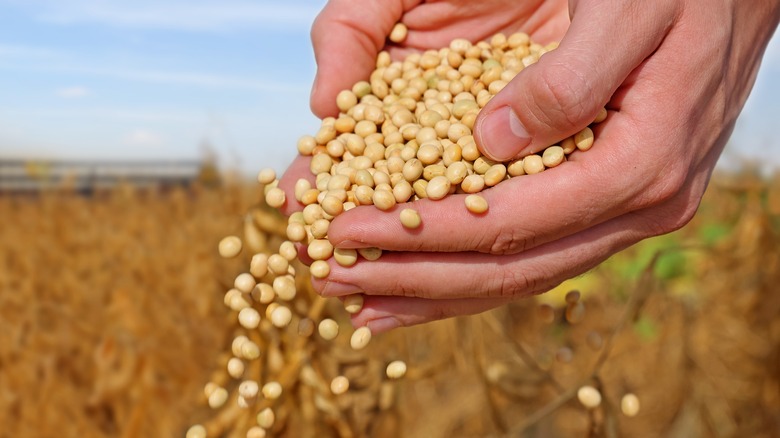Soybeans May Reduce Your Risk Of Cancer And Curb Menopause Symptoms — But With One Caveat
Eating soybeans and soy-based products could benefit your health. In fact, the antioxidants in soybeans may reduce your chances of developing cancer, as well as ease hot flashes, a common menopause symptom. (Here's what happens to your body when you eat soy every day.)
Soybeans contain a type of antioxidant called isoflavones, making it feasible for you to get plenty of isoflavones in a relatively small quantity of soybean foods. A half-cup serving of dried and roasted soybeans will net you 37 grams of isoflavones. The same holds for just 3 ounces of tempeh.
Studies have shown that eating isoflavones each day may protect you against a few types of cancer. A 2020 review in Antioxidants identified a correlation between the daily intake of soy and a reduced likelihood of developing or dying from breast cancer. Eating 5 grams of soy isoflavones daily appeared to decrease breast cancer risk by 12%.
How soy consumption affects cancer risk
Interestingly, the timing of when you first start eating soy isoflavones may matter, particularly if you're attempting to get as much protection against breast cancer as you can. A 2009 article in Nutrition and Cancer concluded that eating soy before adulthood may prevent breast cancer later in life.
Meanwhile, a 2010 review in the Journal of Epidemiology found that breast cancer prevalence was reduced among women living in Asia rather than in women from Western societies. This may partly be due to conventional Asian diets that provide early exposure to a myriad of soy-rich foods. The findings suggest that soy's breast cancer preventative effects may depend upon when you first eat soy, how often you continue to eat soy, and how much total soy you eat.
Additionally, evidence suggests that eating soy has an unexpected effect on a man's prostate. Per a 2018 review in Nutrients, consuming soy foods has shown potential in lowering the incidence of prostate cancer.
All these findings are important since more than two million people receive a cancer diagnosis every year, according to the National Cancer Institute. Breast and prostate cancer are among the most prevalent cancers (as well as the leading causes of cancer deaths) for people living in the United States.
Good news for women who enjoy soy
Soy isoflavones may soften menopausal side effects like those notorious and uncomfortable hot flashes that can leave women drenched. According to a 2006 review in Maturitas, women could reduce their "flushing" (another name for hot flashes) experiences by supplementing their diets with soy. Those women who had the greatest number of hot flashes each day seemed to benefit more from using soy to curb their temperature fluctuations. Similarly, a 2021 study in Menopause found that women who were given soy supplementation for 12 weeks reduced their hot flashes by an average of 79%.
Despite its cancer-battling and menopause-easing advantages, there are a couple of possible downsides to incorporating more soy into your diet. Increased consumption of soy has been associated with a possible rise in hypothyroidism responses, as a 2011 study in the Journal of Clinical Endocrinology & Metabolism found. Some people experience diarrhea or flatulence due to soy's fiber content. Others experience unpleasant immune responses because of soy allergies. (Here are some foods to avoid if you have a soy allergy.)


